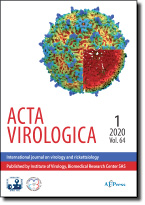Journal info
|
||
Select Journal
Journals
Bratislava Medical Journal Endocrine Regulations General Physiology and Biophysics Neoplasma Acta Virologica Current articles 2023 2022 2021 2020 2019 2018 2017 2016 2015 2014 2013 2012 2011 2010 2009 2008 2007 2006 2005 2004 2003 Studia Psychologica Cardiology Letters Psychológia a patopsych. dieťaťa Kovove Materialy-Metallic Materials Slovenská hudbaWebshop Cart
Your Cart is currently empty.
Info: Your browser does not accept cookies. To put products into your cart and purchase them you need to enable cookies.
Acta Virologica Vol.64, No.2, p.201-215, 2020 |
||
| Title: Metabolic reprogramming as a feast for virus replication | ||
| Author: K. POLCICOVA, L. BADUROVA, J. TOMASKOVA | ||
| Abstract: Viral replication depends entirely on the energy and biosynthetic precursors supplied by the host cell metabolic network. Viruses actively reprogram host cell metabolism to establish optimal environment for their replication and spread. They stimulate the uptake of extracellular nutrients and predominantly modulate glucose, glutamine, and fatty acid metabolism to support anabolic metabolic pathways. Some viruses activate the process of aerobic glycolysis, divert the glycolytic carbon for biosynthetic reactions, and stimulate glutamine utilization to replenish tricarboxylic cycle intermediates. Others use glutamine carbon to promote de novo fatty acid synthesis, amino acid supply or glutathione production. The unique metabolic signature and different dependence of viral life cycle on the individual metabolic processes is therefore characteristic feature of almost each virus. Deeper understanding of how viruses alter cellular metabolic pathways or their upstream regulatory circuits may lead to development of more effective antiviral treatment strategies based on targeted metabolic inhibition. |
||
| Keywords: virus infection; metabolism; glycolysis; glutamine metabolism; fatty acid synthesis; metabolic reprogramming; virus-host interaction | ||
| Published online: 04-May-2020 | ||
| Year: 2020, Volume: 64, Issue: 2 | Page From: 201, Page To: 215 | |
| doi:10.4149/av_2020_210 |
||
|
|
 download file download file |
|

